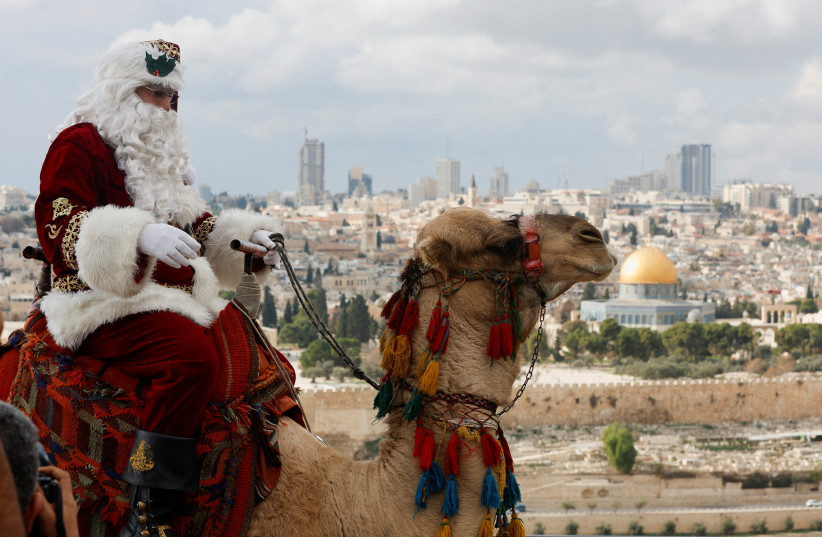The end of the Gregorian year 2022 is no more than several weeks away, and nary a word on the seasonal December dilemma. By this time of the month, it’s common to find human-interest pieces focusing on the conflict that Jews face, with both the secular and religious festivities, that take place during the month of December throughout the Diaspora.
In the past there have been tales of children in public schools being shamed into participating in Christmas pageants, advice on how to discreetly avoid attending mistletoe-decorated office parties, and demands by Jewish organizations that there be a giant hanukkiah to stand alongside the Christmas tree in a shopping center or neighborhood square. Nothing yet, at least none that I’ve come across.
Truth be told, for the last several years there has been a noticeable absence of dilemma-related stories, but that was to be expected. The pandemic did, after all, place severe restrictions on social gatherings, so the Hanukkah-Christmas conflict was understandably pushed to the periphery. Plays, parties, and public celebrations are not really suitable for Zoom, so both the Hanukkah and Christmas revelries were replaced, for the most part, by private, family-oriented activities.
Now that we’re unencumbered by such distancing requirements and the masks have been stored away in the underwear or sock drawer – at least for the time being – the traditional merry-making for the month of December is on track, once again. And Jewish parents, as in previous years, will have to patiently explain to their children why they will not be visited by Santa, why candy canes and tree shaped milk chocolate snacks should be left on the supermarket shelves (even if they are kosher), and why lighting a menorah and spinning a dreidel is more fun than opening presents under a brightly decorated tree.
Or will they?
The absence of media items focusing on the familiar seasonal conflict suggests, forebodingly, that the dilemma is not as severe as it once was. Which means that the growing influence of assimilation and intermarriage is removing what, not too long ago, was an unyielding stigma against Jews celebrating or even acknowledging Christmas. Jewish communities throughout the world are, now, more readily accepting the concept of a seasonal holiday period. They see nothing wrong with enjoying the secular aspects of what is most certainly the holiest day in the Christian calendar.

DECEMBER 25 has, from a Jewish perspective, turned into a winter version of July 4; a holiday in which friends and family get together and nosh on latkes, while singing carols or watching the ghostly transformation of Dickens’s Scrooge. Room, in other words, has been carved out to comfortably merge the two December holidays into a single unit. In other words, “Merry Hanukkah.”
Not that this occurred overnight. Over the last decade or so there have been troubling signs that Jews, in the interests of both family and community relations, are accepting a fusion of Hanukkah and Christmas and finding ways to bring both into the spotlight simultaneously. Depictions of Rudolph the Reindeer, with antlers in the shape of a hanukkiah, decorate cards and party invitations. Dreidels spill out from the sack of toys which Santa schleps around. And the traditional “Maoz Tzur” that is chanted each evening after the lighting of Hanukkah candles is sung to the tune of Jingle Bells. We are doing to ourselves what the antisemites of the world left undone.
I am not among those who perceive intermarriage to be a latter-day holocaust, but to see Jewish children being denied the opportunity to fully appreciate their own heritage is more than a little disheartening. And any argument that this provides those children with a greater appreciation and understanding of the world around them is shallow. I’m aware that there are Reform rabbis who enthusiastically participate in interdenominational services, believing that this practice is an inevitable social evolution.
I can’t help but wonder, however, if these same rabbis are giving their consent to having Jews embrace the spirit if not the soul of Christmas, together with the miracles associated with Hanukkah. Little wonder that the conflicts involving the shared space of Hanukkah and Christmas are disappearing from view.
The dilemma, however, has shifted ever so slightly, but noticeably from the diaspora to Israel. With many thousands of non-Jewish immigrants from the former Soviet Union (FSU) now residing throughout Israel, it is impossible to ignore the fact that there is more public awareness of Christmas here. In several neighborhoods, storefronts display trees and plastic elves to draw in customers who celebrate Christmas.
Advertisements for holiday parties and communal meals are also scattered throughout social media. Boutique and home-based bakeries offer cookies and pastries with red and green frosting. And while marketing brochures focus on the artificially created gift-giving nature of Hanukkah, the designs and content not infrequently provide a subliminal reminder of that other gift giving holiday.
There is currently a national debate regarding the law of return. Bibi’s more stringent coalition partners are pushing to have it amended to no longer accept a single grandparent as criterion for Israeli citizenship. That the discussion is taking place at this time of the year may be more than mere coincidence. Nobody is denying the academic and cultural contributions made by FSU immigrants. But nobody can deny the difficulties resulting from a large proportion of citizens who are not Jewish and have no interest in converting.
I’m with those, therefore, who argue that the stream from the faucet must be slowed down, if not stopped altogether, and grant citizenship and residency only to those who are halachically Jewish. This should be the course of action for the new government, if for no other reason than to keep our local December dilemma from growing out of control.
The writer is a retired technical communicator currently assisting non-profit organizations in the preparation of grant submissions.
